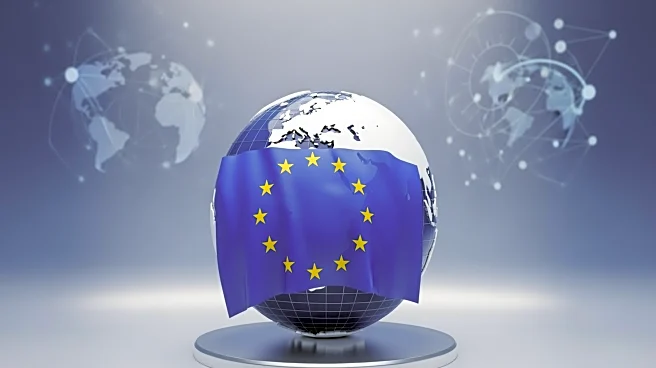What's Happening?
The European Council on Foreign Relations (ECFR) has released a policy brief discussing the threats to the liberal rules-based international order. The brief emphasizes the need for the European Union
to place the defense of this order at the center of its global strategy. The authors argue that the EU should support liberal values abroad by leveraging its economic power and forming alliances with like-minded states. The brief also suggests that the EU should adapt its strategy to protect the core elements of the order in an era where illiberal states are gaining influence. Additionally, the EU is encouraged to strengthen its financial independence and security capacity to back up its defense of the order.
Why It's Important?
The preservation of a liberal rules-based international order is crucial for maintaining global stability and promoting democratic values. The ECFR's recommendations highlight the EU's role in countering the growing influence of illiberal states, which could undermine international norms and agreements. By prioritizing the defense of this order, the EU can safeguard its interests and values, ensuring that multilateralism remains a viable approach to global governance. This strategy could also mitigate the diplomatic challenges posed by President Trump's policies, which have created a deficit in global diplomacy.
What's Next?
The EU is expected to implement strategies that reinforce its commitment to a liberal international order. This may involve enhancing its economic and security capabilities, as well as forming strategic alliances with other nations that share similar values. The EU's actions could influence global diplomatic dynamics, potentially leading to a realignment of international partnerships and agreements. Stakeholders, including political leaders and civil society groups, will likely monitor these developments closely to assess their impact on global governance.
Beyond the Headlines
The ECFR's call for a redesigned rules-based order reflects broader concerns about the erosion of democratic norms worldwide. The emphasis on sovereignty and the role of non-state actors suggests a shift towards more inclusive and flexible governance models. This approach could lead to long-term changes in how international relations are conducted, with implications for global cooperation on issues such as climate change and human rights.








